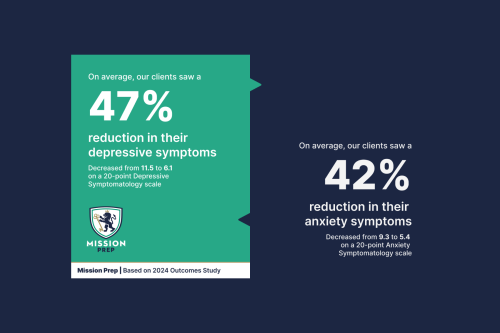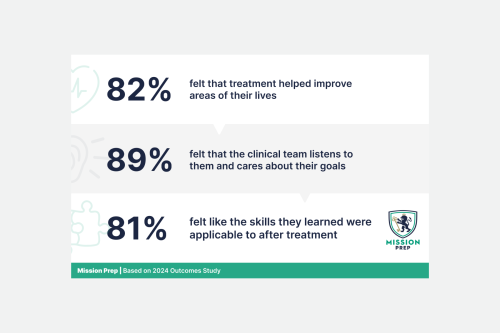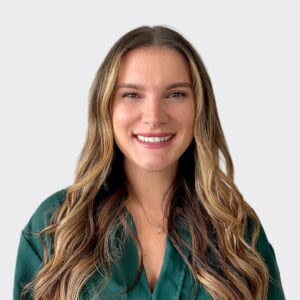






Mission Prep Teen Treatment
Treatment Focus
This center treats mental health conditions and co-occurring substance use. You receive collaborative, individualized treatment that addresses both issues for whole-person healing.
Primary Level of Care
Offering intensive care with 24/7 monitoring, residential treatment is typically 30 days and can cover multiple levels of care. Length can range from 14 to 90 days typically.
Claimed
Recovery.com has connected directly with this treatment provider to validate the information in their profile.
Treatment Focus
This center treats mental health conditions and co-occurring substance use. You receive collaborative, individualized treatment that addresses both issues for whole-person healing.
Primary Level of Care
Offering intensive care with 24/7 monitoring, residential treatment is typically 30 days and can cover multiple levels of care. Length can range from 14 to 90 days typically.
Provider's Policy
Mission Prep is in-network with Anthem, Blue Cross, and its affiliates and also works with most PPO insurance plans, which can cover 100% of treatment costs after deductibles and out of pocket are met. Our insurance experts offer a free, confidential benefit verification to provide you with a clear understanding of the potential costs at our facility and how to make the most of your insurance benefits.
Mission Prep Teen Treatment
Mission Prep Teen Treatment
About Mission Prep Teen Treatment
Mission Prep California stands as a sanctuary of healing, nestled in the tranquil surroundings of San Juan Capistrano. A versatile mental health oasis offering residential, outpatient, and virtual care, it specializes in the comprehensive mental well-being of adolescents. The essence of its approach lies in the belief that true recovery flourishes beyond traditional therapy and medication.
Within the comforting embrace of their facility, every detail is carefully curated to nurture both mind and body. From the continuous, personalized care available around the clock to creating a warm, supportive atmosphere, every aspect of their program is designed with strategic intent and deep compassion. Mission Prep goes beyond standard treatment modalities by incorporating chef-prepared, nutritious meals and fostering nurturing therapeutic relationships, all underpinned by a commitment to evidence-based methods. Each step on the journey towards wellness is thoughtfully designed to ensure a holistic path to recovery.
Integrative Mental Health Treatment for Teens
Mission Prep California uses comprehensive assessments to learn more about client’s symptoms, history, challenges, and strengths. With this understanding, they craft treatment plans that match their strengths and challenges. They treat primary and co-occurring:
- Depression
- Anxiety
- Trauma
- Post-Traumatic Stress Disorder (PTSD)
- ADHD, ADD
- Mood and Thought Disorders (Bipolar, Schizophrenia, etc.)
- Suicidality
- Academic and Social Challenges
- Technology Addiction
Mission Prep’s weekly clinical programming includes medication management, multiple individual sessions weekly, weekly family therapy, and case management.
Individualized, Evidence-Based Care
Mission Prep’s evidence-based, compassionate approach addresses the root causes of mental health concerns, complemented by medication when necessary. Licensed practitioners use cognitive behavioral therapy (CBT), dialectical behavior therapy (DBT), eye movement desensitization and reprocessing (EMDR), acceptance and commitment therapy (ACT), and more. Clients receive 2 weekly individual counseling sessions, weekly family therapy, and 2 weekly clinical mentoring sessions. Mission Prep incorporates mindfulness practices throughout their program to enhance the evidence-based treatments effectiveness. Embracing a holistic approach to recovery, Mission Prep offers specialized groups, including Rock to Recovery, nutrition sessions, gardening groups, art therapy, and yoga classes. Clients also engage in life skills training and psychoeducation.
A Comfortable Residential Home in California
Nestled in tranquil San Juan Capistrano, Mission Prep’s residential center offers a serene, home-like environment. The 6-bed house boasts semi-private rooms, cozy living areas, specialized therapeutic spaces, and a picturesque backyard complete with a relaxing porch. Teens are encouraged to bring personal items like cell phones, chargers, and musical instruments such as guitars. They offer intake and discharge transportation from LAX or Long Beach Airport as needed. Clients can use cell phones and laptops under staff supervision. Following residential care, Mission Prep extends comprehensive aftercare services with family follow-up counseling and connections to community resources.

Center Overview
Treatment Focus
This center treats mental health conditions and co-occurring substance use. You receive collaborative, individualized treatment that addresses both issues for whole-person healing.
Joint Commission Accredited
The Joint Commission accreditation is a voluntary, objective process that evaluates and accredits healthcare organizations (like treatment centers) based on performance standards designed to improve quality and safety for patients. To be accredited means the treatment center has been found to meet the Commission's standards for quality and safety in patient care.

Insurance Accepted
Cash Pay Rates
Estimated Cash Pay Rate
Center pricing can vary based on program and length of stay. Contact the center for more information. Recovery.com strives for price transparency so you can make an informed decision.
Meet Your Care Team

Aja Chavez
National Executive Director

Dr. William Dodge
Medical Doctor

Jude Levasseur
Psychiatric Nurse Practitioner

Fernanda Perez-Rios
Associative Executive Director

Hilda Soriano
Program Manager

Kevin Perez
Clinical Supervisor

Katie Meller
Therapist

Britney Rodriguez
Therapist

Lisa Williams
Therapist

Christine Patrikian
Music Therapist

Samantha Avila
Nurse

Kristina Duster
Nurse

Micaela Spoonemore
Clinical Mentor

Ke'von Patterson
Clinical Mentor

Miriam Tapia
Clinical Mentor

Taeko Tucker
Clinical Mentor

Kyle Walkwitz
Clinical Mentor

Kailey Stapel
Experiential Supervisor

Nyaa Davis
Program Manager

Kayla Kamego
Residential Supervisor

Sandy Ho
Residential Supervisor
Levels of Care





Your Care Options
Specializations
Anxiety
Anxiety is a common mental health condition that can include excessive worry, panic attacks, physical tension, and increased blood pressure.
Depression
Symptoms of depression may include fatigue, a sense of numbness, and loss of interest in activities. This condition can range from mild to severe.
Adolescents
Teens receive the treatment they need for mental health disorders and addiction, with the added support of educational and vocational services.
Trauma
Some traumatic events are so disturbing that they cause long-term mental health problems. Those ongoing issues can also be referred to as "trauma."
ADHD, ADD
ADHD is a common mental health condition caused by dopamine imbalance. Common symptoms include inattention, hyperactivitiy, and impulsivity.
Who We Treat
Adolescents
Teens receive the treatment they need for mental health disorders and addiction, with the added support of educational and vocational services.
LGBTQ+
Addiction and mental illnesses in the LGBTQ+ community must be treated with an affirming, safe, and relevant approach, which many centers provide.
Approaches
Gender-Specific
Separate treatment for men or women can create strong peer connections and remove barriers related to trauma, shame, and gender-specific nuances.
Holistic
A non-medicinal, wellness-focused approach that aims to align the mind, body, and spirit for deep and lasting healing.
Evidence-Based
A combination of scientifically rooted therapies and treatments make up evidence-based care, defined by their measured and proven results.
Family Involvement
Providers involve family in the treatment of their loved one through family therapy, visits, or both–because addiction is a family disease.
Therapies
Stress Management
Patients learn specific stress management techniques, like breathing exercises and how to safely anticipate triggers.
Narrative Therapy
Through narrative therapy, patients rewrite past events with a positive focus. They separate themselves from the problem to see their purpose and capabilities.
1-on-1 Counseling
Patient and therapist meet 1-on-1 to work through difficult emotions and behavioral challenges in a personal, private setting.
Family Therapy
Family therapy addresses group dynamics within a family system, with a focus on improving communication and interrupting unhealthy relationship patterns.
Equine Therapy
Guided interactions with trained horses, their handler, and a therapist can help patients improve their self-esteem, trust, empathy, and social skills.
Acceptance and Commitment Therapy (ACT)
This cognitive behavioral therapy teaches patients to accept challenging feelings and make the appropriate changes to reach personal goals.
Conditions We Treat
Post Traumatic Stress Disorder
PTSD is a long-term mental health issue caused by a disturbing event or events. Symptoms include anxiety, dissociation, flashbacks, and intrusive thoughts.
Anxiety
Anxiety is a common mental health condition that can include excessive worry, panic attacks, physical tension, and increased blood pressure.
Depression
Symptoms of depression may include fatigue, a sense of numbness, and loss of interest in activities. This condition can range from mild to severe.
Schizophrenia
Schizophrenia is a serious mental health condition that causes hallucinations, delusions, and disordered thinking.
Grief and Loss
Grief is a natural reaction to loss, but severe grief can interfere with your ability to function. You can get treatment for this condition.
Codependency
Codependency is a pattern of emotional dependence and controlling behavior. It's most common among people with addicted loved ones.
Suicidality
With suicidality, a person fantasizes about suicide, or makes a plan to carry it out. This is a serious mental health symptom.
Obsessive Compulsive Disorder (OCD)
OCD is characterized by intrusive and distressing thoughts that drive repetitive behaviors. This pattern disrupts daily life and relationships.
Substances We Treat
Co-Occurring Disorders
A person with multiple mental health diagnoses, such as addiction and depression, has co-occurring disorders also called dual diagnosis.
Languages
Aftercare
Care Designed for Your Needs
Personal Amenities
Amenities
Special Considerations
Healthy Meals are provided
Great food meets great treatment, with providers serving healthy meals to restore nutrition, wellbeing, and health.
Gender-specific groups
Patients in gender-specific groups gain the opportunity to discuss challenges unique to their gender in a comfortable, safe setting conducive to healing.
Activities
Yoga
Yoga is both a physical and spiritual practice. It includes a flow of movement, breathing techniques, and meditation.
Off-Site Activities
Off-Site Amenities






